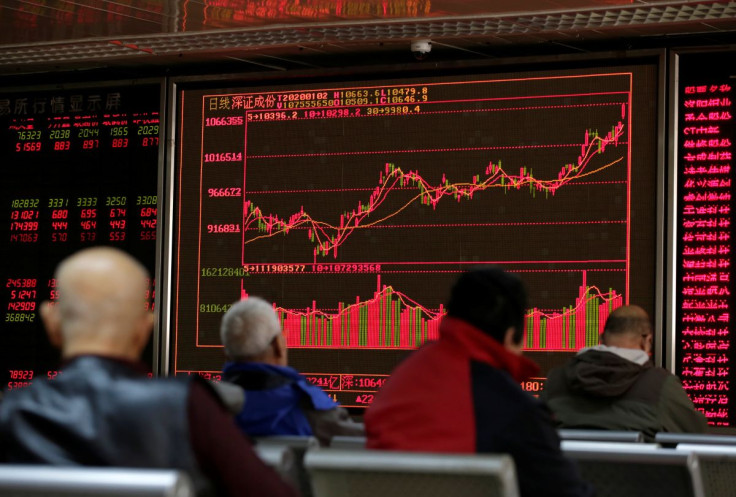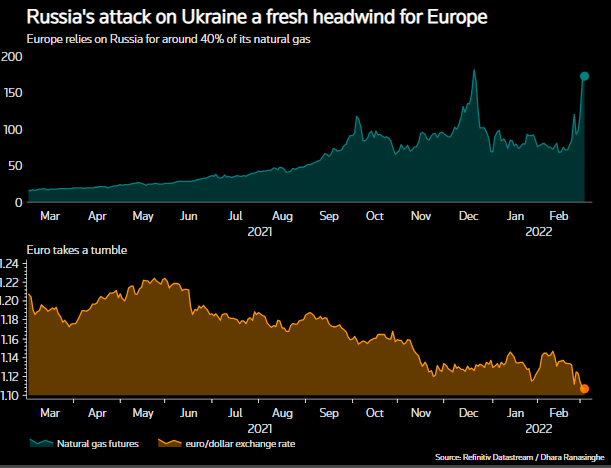Oil Surge Rattles Markets As Ukraine Conflict Intensifies

Oil prices soared again on Thursday as the Ukraine war triggered a dash for commodities that could be in short supply, while stock markets slipped as investors worried about higher inflation and slowing economic growth.
Brent crude oil rose more than 5% to within a whisker of $120 per barrel before settling at $114. That still leaves it up nearly 20% since last Thursday, while everything from coal to natural gas and aluminium are surging as Western nations tighten sanctions on Russia following its invasion of Ukraine. Russia calls its actions a "special operation".
"Russia supplies around 30% of Europe's gas and oil imports and accounts for around 11% of world oil production," said Shane Oliver, head of investment strategy at fund manager AMP. "In short, investors are worried about a stagflationary shock."
MSCI added to Russia's financial isolation by deciding to shut the country out of its emerging markets index, while FTSE Russell said Russia would be removed from all its indices.
Fitch slashed Russia's sovereign credit rating six notches to "junk" status, saying it was uncertain the country could service its debt, and Moody's soon followed.
European stocks fell at the open, failing to follow on from Wall Street's late rally after Federal Reserve Chair Jerome Powell said the central bank would raise rates by 0.25% this month, less than the 0.5% some investors had bet on.
Not all investors are worried about inflation remaining higher in the medium term.
"On inflation, we think it is most likely that headline consumer prices will peak within the next one or two months," said Mark Haefele, Chief Investment Officer, UBS Global Wealth Management, which he added would allow the Fed to raise rates at a pace that did not undermine the economic recovery.
The Euro STOXX was down 0.5% while the FTSE 100 weakened 0.65% and Germany's DAX dropped 0.89%.
Wall Street futures pointed to a slightly weaker open.
In Asia, the rush to commodities lifted resource-rich Australian stocks 0.49%.
Japan's Nikkei managed a 0.7% gain, while MSCI's broadest index of Asia-Pacific shares outside Japan nudged up 0.39%.
In currency markets, the euro dropped 0.2% to $1.10793, close to 21-month lows as investors dumped European assets, fearful about the impact of the war in Ukraine on the region's economy.
Graphic: The euro and gas prices:

The dollar index rose 0.1% to 97.531.
Powell on Wednesday warned the Fed might have to hike more aggressively if inflation kept rising.
That took some of the safe-haven steam out of Treasuries and 10-year yields were back at 1.857%, against Tuesday's two-month trough of 1.682%.
European bonds also surrendered some of their recent hefty gains after data showed euro zone inflation hit a record high of 5.8% in January, making it harder for the ECB to keep policy super loose.
Inflation was also on the mind of the Bank of Canada when it kicked of a tightening cycle on Wednesday with a quarter-point rate hike to 0.5%.
The move combined with the strength of oil prices to lift the Canadian dollar briefly to a five-week high at $1.2584. Other commodity-linked currencies also benefited with the Australian dollar at a four-year peak on the euro.
Gold rallied 0.46% to $1,935 an ounce thanks to safe-haven demand. [GOL/]
© Copyright Thomson Reuters 2024. All rights reserved.





















